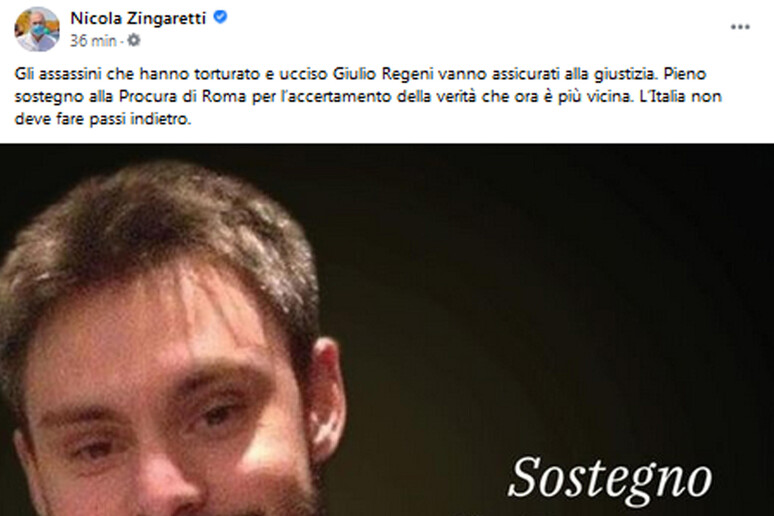Three new witnesses have accused four
Egyptian security apparatus members of torturing and murdering
Italian student Giulio Regeni in Cairo in January-February 2016,
Rome prosecutors said Wednesday.
The fresh testimony has emerged in documents filed ahead of the
preliminary hearing in absentia on April 29 of National Security
General Tariq Sabir and his subordinates, Colonels Athar Kamel
Mohamed Ibrahim and Uhsam Helmi, and Major Magdi Ibrahim Abdelal
Sharif.
The hearing will weigh Rome prosecutors' request to indict them
for Regeni's murder.
One of the witnesses has reportedly told the prosecutors that
the four staged a "robbery gone wrong" to try to cover up
Regeni's torture and murder.
On January 25, the fifth anniversary of Regeni's disappearance
on the Cairo metro, President Sergio Mattarella demanded a
response from Egypt over the Friuli-born student's torture and
murder.
The brutalised body of the Cambridge University doctoral
researcher into the politically sensitive topic of Egyptian
street unions was found a week later, on February 3, 2016, in a
ditch on the road to Alexandria.
He had been tortured so badly his mother said she only
recognised him by the tip of his nose.
Regeni's parents, Claudio Regeni and Paola Deffendi, have
accused the government of continuing to do business with Egypt,
selling Cairo two frigates.
Rome prosecutors say that Regeni was tortured for days,
resulting in "acute physical suffering" by being subjected to
kicks, punches, beaten with sticks and bats and cut with sharp
objects, and also being burned with red-hot objects and slammed
into walls.
Egypt's prosecutor general, Hamada al Sawi, has said "there is
insufficient evidence to prove the charges".
The witnesses, deemed reliable by the prosecutors, say Regeni
was abducted by agents of the Egyptian National Security Agency
on January 25, 2016, the heavily policed fifth anniversary of
the uprising that ousted former strongman Hosni Mubarak, and
taken to at least two
barracks in the subsequent hours.
The young man from Friuli was seen in a barracks near the Dokki
metro stop in Cairo, the witnesses said, and later at another
barracks where young foreigners are usually taken.
Regeni was found dead in the ditch on the Cairo-Alexandria
highway on February 3, 2016, a week after disappearing.
At various times Egypt has advanced differing explanations for
his death including a car accident, a gay lovers' tiff and
abduction and murder by an alleged kidnapping gang that was
wiped out after Regeni's documents were planted in their lair.
The head of the street hawkers union had fingered Regeni as a
possible spy.
Lack of cooperation on the case by Egypt led to Rome's
temporarily withdrawing its ambassador from Cairo.
Rome drew condemnation from Regeni's parents last summer by
announcing the sale of the two frigates to Egypt.
Despite the protests, the $1.2 billion (988 billion euro) sale
went ahead in June.
Regeni's father Claudio called for Italy to again withdraw its
ambassador from Cairo, saying that the two countries had
recently seen a "normalisation of relations and the development
of mutual interests in the economic, financial and military
fields, as shown by the recent sale of the frigates, and in
tourism, avoiding any clash".
He said the search for the truth about his son's death had been
placed "on a secondary level" with respect to these interests.
Regeni's mother Paola Deffendi said "Our family fight has become
a fight of civilisation for human rights, which is as if Giulio
were acting himself. Giulio has become a mirror that shines all
over the world, showing how human rights are violated in Egypt
every day".
ALL RIGHTS RESERVED © Copyright ANSA











